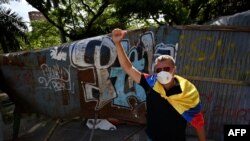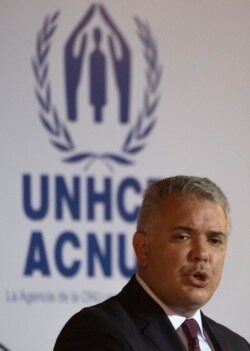Colombian President Ivan Duque said on Tuesday the government is ready for national dialogue after days of protests led to over 20 deaths and international concern about excessive use of force by police.
The protests, set to continue on Wednesday, were originally called in opposition to the government's now-canceled tax reform plan but have become a broad cry for action against poverty and what demonstrators and advocacy groups say is police violence.
All Colombians should work to reject violence, protect the most vulnerable and support COVID-19 vaccination and economic reactivation, Duque said in a video.
"I want to announce that we will create a space to listen to citizens and construct solutions oriented toward those goals, where our most profound patriotism, and not political differences, should intercede," Duque said.
Duque's promise echoed the 2019 creation of a so-called national dialogue after days of anti-government protests.
Civil society groups, especially major unions, have said the government has not lived up to those promises and has done little to change deep inequalities in the Andean country.
Mass marches and a national strike are planned for Wednesday, where demonstrators will call for a basic income guarantee, the withdrawal of a government health reform proposal and the dissolution of the ESMAD riot police.
Duque responded to allegations of police overreach and rejected attacks on officers.
"To those who work for the security of Colombians: all our support, and at the same time, all our expectation."
The national police force has said it will investigate more than two dozen allegations of brutality, while the defense minister has accused illegal armed groups of infiltrating the protests to cause violence.
The western city of Cali has become the focus of protests since they began almost a week ago and is the site of 11 of the 19 deaths confirmed by the Andean country's human rights ombudsman as of Monday. Local authorities said five more people were killed during protests there Monday night.
Some 87 people have been reported missing nationally since the protests started, according to the ombudsman.
Intermittent road blockades are delaying shipments out of the Pacific port city of Buenaventura, according to local authorities.
The United Nation's Office of the High Commissioner for Human Rights urged calm, saying it was "deeply alarmed" by reports of police shootings.
The European Union also called for security forces to avoid a heavy-handed response.
Protests have so far led to the withdrawal of the original tax reform and the resignation of Finance Minister Alberto Carrasquilla. The government said the reform, which originally levied sales tax on public services and some food, would shore up the economy.
Duque has said his government will draw up another proposal after consultations with lawmakers, civil society and businesses.
New Finance Minister Jose Manuel Restrepo will need to convince Colombians, many of whom have seen their incomes battered by coronavirus lockdowns, that reform is vital, former Finance Minister Mauricio Cardenas told the Reuters Global Markets Forum on Tuesday.
Restrepo "has a huge challenge ahead" Cardenas said.
Duque has offered military assistance to protect infrastructure and guarantee access to essential services, though mayors of cities including Bogota and Medellin said it was unnecessary.
Duque on Tuesday canceled his nightly television show for the first time since the coronavirus pandemic began, and the protests forced the South American Football Confederation to move two Copa Libertadores games to Paraguay.









